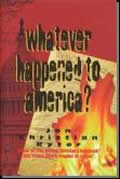DEBT IS DESTROYING AMERICA
By Jon Christian Ryter
March 6, 2008
NewsWithViews.com
When he made his mid-morning TV address on Thursday, Feb. 27, President George W. Bush spoke briefly on the economy, sounding more like a wishful Herbert Hoover trying to conjole the economy out of the doldrums than a student of backyard capitalism assuring his neighbors that the economy of the United States is still healthy even though the nation continues to hemorrhage jobs�and money as our trade deficit grows and the United States assumes the undisputed title as the world's largest debtor nation. Bush noted that he didn't think we were headed into a recession although he admitted the economy was slowing down. Under the rules of backyard capitalism, if you still have your job as money tightens and jobs get scarce, the economy is slowing down. If you lost your job, its a recession. If everyone in the neighborhood looses theirs, it a depression.
All political rhetoric aside, here's the simple truth. When the working class has to use plastic as a lifeline to splice the first of the month with the end of the month because they lack sufficient monetary liquidity to pay their bills, the economy is in real trouble. The folks at the top of the pyramid who have been playing the money shell game with the economy since 1993 succeeded in fabricating the illusion that a very anemic economy was healthy based not on consumer capital liquidity but the inflated value of the stock market. Liquidity was artificially stimulated by providing the working class with toxic mortgages that were nothing less than financial time bombs, and with lines of credit they couldn't afford�but were needed by the societal planners to jumpstart the economy and make it appear that the jobs being exported to Mexico, China and the third world were not impacting our economy, and that the plans of the globalists to create an American Union by stimulating the free enterprise system in the western hemisphere were economically solid.
However, the consumers who participated in the globalists' grand scheme are proof-positive that the utopian dream of universal prosperity is just so much puppy poop. The victims of the subprime home mortgage debacle were also the first victims of the subprime credit card debacle. However, before the banks and credit card companies started the plastic tsunami they successfully lobbied Congress to change the bankruptcy laws to make sure those they were about to flood with credit couldn't escape the debt.
The tragedy for the real victims of the subprime debacle�the consumers who got trapped in a credit circle of despair�is that they can't escape. They grab the subprime credit cards even at exorbitant interest rates because they provide them with the appearance of liquidity that marginal credit risk consumers heretofore did not possess. Everything was fine until the ARMs kicked up a notch, sending mortgage payments spiraling skyward. Sequentially, what happens is whatever discretionary income exists will be rapidly depleted as rising interest rates eat up the cash. As cash dries up, money to pay all debts�not just the mortgage payment and the credit card payments, but the local utility payments�also dry up. Late utility payments starts the domino affect that impacts the consumer's credit score, which in turn triggers an increase in the interest rates on that consumer's credit cards and even causes the premiums on their auto insurance to rise, depleting even more of what little discretionary income is left in the household.
What ultimately happens is an absolute dependency on plastic. Hard-pressed consumers today are living on plastic. Their credit cards are more important than cash since plastic has become the only cash they have. They use plastic to pay other debts�even to the extent of using cash advances on their credit cards to make their minimum credit card payments.
As US companies downsize and terminate employees or cut their hours, today's consumer is adjusting to the task of living on less income in a time of rapidly spiraling costs. Todays incomes are having more trouble stretching from payday to payday. Many of those with home equity lines of credit use them to buy groceries, pay their utility bills and put gas in the family car. For many, the home equity line of credit becomes the "cash" that is ultimately used to make their mortgage payments.
As the economy worsens�and it will�credit will tighten even more. Those with good jobs and stellar credit won't notice the belt-tightening at first, but Joe and Judy Workingclass, who've fallen on hard times and have been forced to juggle their financial resources far too often and have paid their mortgages and credit card payments late have discovered those essential lifeblood lines of credit have vanished and the available credit on their plastic has melted into oblivion. Daniel Trevor, a well-to-do home owner in suburban Phoenix, Arizona had a handful of friends whose banks cut off their home equity lines of credit. Trevor, who pays his bills on time, never thought it would happen to him. Trevor never used his quarter million home equity line of credit until last month when he tapped his home equity line of credit to finance an investment he was advised by his broker to grab. Much to his surprise, he received a call from his bank advising him the funds he needed would not be available. They froze his loan, they said, because the equity in his home had dminished because of plummeting home prices. Nationwide, home prices dropped 8.9%. Home prices plummeted 15.3% in Phoenix and Las Vegas and by 17.5% in Miami, Florida. Since the subprime crash, banks have erased over $1.5 trillion in home equity wealth.
One Countrywide Mortgage homeowner was dismayed when the mortgage company froze his credit line in the middle of a major home remodeling. Citing falling home values in his area, Countrywide wouldn't let him withdraw the funds he needed to repair several rooms that had been gutted to the studs. The American dream has taken a fatalist detour in which the consumer increasingly is pushed against the wall as their financial resources dwindle. Keeping the credit cards payments current takes precedent over keeping the mortgage payment current. When the money�or the available credit�doesn't stretch from payday to payday and tough choices need to made, nine-times-out-of-ten, they will let the mortgage payment slip and make the credit card payments because it takes three months for a mortgage to go into default. The consumer always believes he will be able to catch up the payments and stave off foreclosure within 90 days.
Experian Decision Analytics noted that most of victims of economic reappraisal are consumers with low credit scores. They are paying their credit cards with what should be their mortgage payments. Equifax statistics verify that 38% of delinquent mortgage holders kept their credit card payments current and 62% kept their car payments current as their homes went into foreclosure. Record home mortgage foreclosures triggered by greedy mortgage brokers who oversold homes using exotic mortgages to get people into homes they couldn't afford started the ripple in the economic domino affect that threatens to cripple some banks, bringing on a new banking crisis unrivaled since the days of the Keating Five. In all, 76 small banks are in trouble. According to Sheila Bair, chairwoman of the Federal Deposit Insurance Corp [FDIC], the troubled bank hold only $22 billion in assets. Bair was prompted to make this statement after Federal Reserve Chairman Ben Bernanke spooked the investment world with a statement before Congress on Thursday in which he said that the central bank faces more difficult issues than it did during the recession in 2001, adding that several small banks are at risk of failing.
On Thursday, Bush noted that the economy was flat, posting a gain of only 0.6 % in the 4th quarter. He blamed it on the still-eroding housing market. Bernanke suggested some banks could fail, causing the NYSE to lose over 300 points on Friday. Instead of thinking in terms of the 76 small banks mentioned by Bair, the media chose to raise questions about Citibank, Bank of America and Merrill Lynch which collectively have over $150 billion in subprime real estate and credit card losses. But each of them, plus Goldman Sachs and JPMorgan Chase have the reserves to avoid failure. The small banks don't have the financial stature to attract foreign capital and are therefore more at risk than the transnational giants.
In January Citibank announced it posted a 4th quarter loss of nearly $10 billion after eating $17 million in subprime chargebacks. To cover the losses, Citibank cut their dividends by 41% after previously assuring investors that their dividends were not in jeopardy. Key Citigroup investors in Singapore, Kuwait and Saudi Arabia kicked in close to $7 billion to stabilize the bank. None of this bodes well for the little guy. While banks and mortgage companies are giving reprieves to owners of delinquent toxic mortgages, the worsening economy will eventually cause them to curb subprime credit card debt. The most profitable business banks have today is subprime because interest rates are 2, 3 or 4 times higher than standard interest rates. During the first half of last year�just before the subprime mortgage collapse�there was a 41% increase in direct mail credit card offers to sub-prime card users. Subprime users are the most vulnerable of getting overloaded with credit card debt. As those consumers max out what credit cards they have they desperately need more since the only "discretionary income" they possess is the available credit on those cards. When financially-strapped consumers max out their credit cards without the prospect of getting another one, they will walk away from their credit card debt the same way they walked away from their toxic mortgages.
When Fairfield, California homeowner Phyllis Coleman's toxic mortgage payment jumped 26% last year she had no recourse but to use plastic to bridge the gap between her resources and her obligations, taking cash advances on her credit cards to make up the mortgage shortfall. When she maxed out her credit cards she lost her home. Hounded by credit card companies for money she didn't have, she walked away from the credit card debt as well.
It appears when the money barons needed to goose the economy they chose to use the least creditworthy consumers to prove that NAFTA wasn't affecting the US economy. According to several credit counselors, using credit cards for daily needs�gas for the car, groceries, or to keep the lights or phone from being shut off is now occurring not only with subprime blue collar workers but middle class professionals as well. Sadly in the next couple of years it is going to get even worse. People have less cash in their pockets, and as the transnational industrialists export even more jobs to Mexico, China, India and Indonesia, and illegal aliens devalue what jobs remain, making ends meet will be even more difficult for the American consumer.
|
Subscribe to the NewsWithViews Daily News Alerts! |
Is there a solution? There's an election coming up. We need to separate the nationalists from the globalists and fire the globalists. We need to retake both Houses of Congress with enough of a majority to override any veto�or an impeachment when we order the President to construct a wall to keep illegals out of the country, or for failing to enforce federal law by arresting and prosecuting corporate executives and seizing the businesses of those who hire illegals; and to legislatively repeal NAFTA�and impeaching any federal judge who does not obey the Constitution including those sitting on the Supreme Court. The globalists believe the Election of 2008 will open the door to the dissolution of the United States of America. Let's show them that November 4, 2008 is an election of the people and for the people of the United States. That's the day the nationalists take their country away from the globalists who are determined to surrender our sovereignty to the Utopians in Europe.
� 2008 Jon C. Ryter - All Rights
Reserved
[Read "Whatever
Happened to America?"]
















